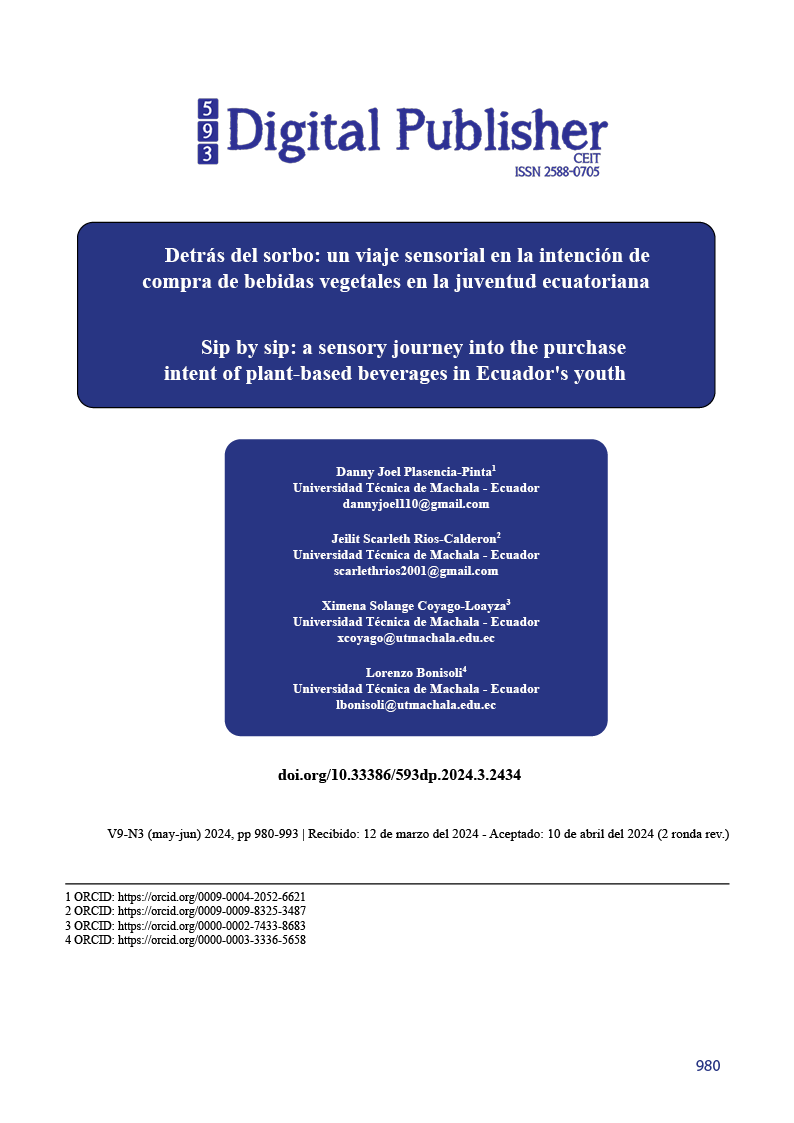Detrás del sorbo: un viaje sensorial en la intención de compra de bebidas vegetales en la juventud ecuatoriana
Contenido principal del artículo
Resumen
La siguiente investigación proporciona un análisis detallado de los factores que influyen en la intención de compra de bebidas vegetales. El estudio se centra en la generación Z ecuatoriana y analiza las variables que influyen en su satisfacción y, por ende, en su decisión de compra. El estudio utiliza un modelo basado en datos sintéticos y ecuaciones estructurales para analizar las relaciones entre las variables. Se recolectaron datos de 630 observaciones sintéticas generadas en una base de 50 respondientes de la generación Z y la técnica SEM PLS se utilizó para interpretar las respuestas. Los hallazgos indicaron que las motivaciones intrínsecas, introyectadas y presión social no tienen un efecto significativo mientras que las variables de contenido natural, atractivo sensorial y motivación identificada influyen en la intención de compra y por ende inciden de manera positiva en la Satisfacción. Estos resultados pueden guiar a que las empresas que producen bebidas vegetales deben enfocarse en resaltar el contenido natural y el atractivo sensorial de sus productos en sus estrategias de marketing.
Descargas
Detalles del artículo

Esta obra está bajo una licencia internacional Creative Commons Atribución-NoComercial-CompartirIgual 4.0.
1. Derechos de autor
Las obras que se publican en 593 Digital Publisher CEIT están sujetas a los siguientes términos:
1.1. 593 Digital Publisher CEIT, conserva los derechos patrimoniales (copyright) de las obras publicadas, favorece y permite la reutilización de las mismas bajo la licencia Licencia Creative Commons 4.0 de Reconocimiento-NoComercial-CompartirIgual 4.0, por lo cual se pueden copiar, usar, difundir, transmitir y exponer públicamente, siempre que:
1.1.a. Se cite la autoría y fuente original de su publicación (revista, editorial, URL).
1.1.b. No se usen para fines comerciales u onerosos.
1.1.c. Se mencione la existencia y especificaciones de esta licencia de uso.
Citas
Ahmed, N., Li, C., Khan, A., Qalati, S. A., Naz, S., & Rana, F. (2021). Purchase intention toward organic food among young consumers using theory of planned behavior: role of environmental concerns and environmental awareness. Journal of Environmental Planning and Management, 64(5), 796–822. https://doi.org/10.1080/09640568.2020.1785404
Ali, F., Ashfaq, M., Begum, S., & Ali, A. (2020). How “Green” thinking and altruism translate into purchasing intentions for electronics products: The intrinsic-extrinsic motivation mechanism. Sustainable Production and Consumption, 24, 281–291. https://doi.org/10.1016/j.spc.2020.07.013
Ashraf, M. A., Joarder, M. H. R., & Ratan, S. R. A. (2019). Consumers’ anti-consumption behavior toward organic food purchase: an analysis using SEM. British Food Journal, 121(1), 104–122. https://doi.org/10.1108/BFJ-02-2018-0072
Bagozzi, R. P., Yi, Y., & Phillips, L. W. (1991). Assessing Construct Validity in Organizational Research. Adm. Sci. Q., 36(3), 421–458. https://doi.org/10.2307/2393203
Birch, D., Memery, J., & De Silva Kanakaratne, M. (2018). The mindful consumer: Balancing egoistic and altruistic motivations to purchase local food. Journal of Retailing and Consumer Services, 40, 221–228. https://doi.org/10.1016/j.jretconser.2017.10.013
Bly, S., Gwozdz, W., & Reisch, L. A. (2015). Exit from the high street: An exploratory study of sustainable fashion consumption pioneers. International Journal of Consumer Studies, 39(2), 125–135. https://doi.org/10.1111/ijcs.12159
Bonisoli, L., & Blacio Guañuna, R. A. (2023). Going green in Ecuador: Unpacking the motivations behind brand loyalty for organic products. Journal of Cleaner Production, 418. https://doi.org/10.1016/j.jclepro.2023.138116
Bouttes, M., Bancarel, A., Doumayzel, S., Viguié, S., Cristobal, M. S., & Martin, G. (2020). Conversion to organic farming increases dairy farmers’ satisfaction independently of the strategies implemented. Agronomy for Sustainable Development, 40(2). https://doi.org/10.1007/s13593-020-00616-5
Braik, A., Saleh, Y., & Jaaron, A. A. M. (2023). Green marketing practices and organizational sustainable performance in developing countries context: an empirical study. Journal of Foodservice Business Research. https://doi.org/10.1080/15378020.2023.2205337
Chekima, B., Chekima, K., & Chekima, K. (2019). Understanding factors underlying actual consumption of organic food: The moderating effect of future orientation. Food Quality and Preference, 74, 49–58. https://doi.org/10.1016/j.foodqual.2018.12.010
Cilla, A., Bosch, L., Barberá, R., & Alegría, A. (2018). Effect of processing on the bioaccessibility of bioactive compounds – A review focusing on carotenoids, minerals, ascorbic acid, tocopherols and polyphenols. Journal of Food Composition and Analysis, 68, 3–15. https://doi.org/10.1016/j.jfca.2017.01.009
Domínguez Avila, J. A., Wall Medrano, A., Ruiz Pardo, C. A., Montalvo González, E., & González Aguilar, G. A. (2018). Use of nonthermal technologies in the production of functional beverages from vegetable ingredients to preserve heat-labile phytochemicals. Journal of Food Processing and Preservation, 42(2). https://doi.org/10.1111/jfpp.13506
Fernandes, N. P., Lunardi, G. L., Rocha, A. F., & Samá, S. (2020). Consumer behavior of organic foods: A model based on direct and indirect influencers. In Revista de Gestao Social e Ambiental (Vol. 14, Issue 2, pp. 48–64). ANPAD - Associacao Nacional de Pos-Graduacao e Pesquisa em Administracao. https://doi.org/10.24857/RGSA.V14I2.2302
Filla, M. C., Garcia, S., & Prudencio, S. H. (2018). Mixed Beverage of Fruits and Vegetables: Effect of Refrigerated Storage on Antioxidant Capacity and Acceptance. Journal of Culinary Science and Technology, 16(3), 237–253. https://doi.org/10.1080/15428052.2017.1390519
Fornell, C., & Larcker, D. (1981). Evaluating Structural Equation Models with Unobservable Variables and Measurement Error. J. Mark. Res., 18, 39–50. All Papers/F/Fornell and Larcker 1981 - Evaluating Structural Equation Models with Unobservable Variables and Measurement Error.pdf
Gallegos-Hernández, B. P., Pérez-Villarreal, H. H., Barahona, I., & Mayett-Moreno, Y. (2018). Analysis of the intrinsic signals, extrinsic signals and the expected quality of the organic tortilla to assess its purchasing intentions. Cogent Business and Management, 5(1), 1–23. https://doi.org/10.1080/23311975.2018.1548548
Gazzola, P., Pavione, E., Pezzetti, R., & Grechi, D. (2020). Trends in the fashion industry. The perception of sustainability and circular economy: A gender/generation quantitative approach. Sustainability (Switzerland), 12(7), 1–19. https://doi.org/10.3390/su12072809
Glenn, B. A., Hamilton, A. S., Nonzee, N. J., Maxwell, A. E., Crespi, C. M., Ryerson, A. B., Chang, L. C., Deapen, D., & Bastani, R. (2018). Obesity, physical activity, and dietary behaviors in an ethnically-diverse sample of cancer survivors with early onset disease. Journal of Psychosocial Oncology, 36(4), 418–436. https://doi.org/10.1080/07347332.2018.1448031
Gonzales, A., Guruswamy, G., & Smith, S. R. (2023). Synthetic data in health care: A narrative review. PLOS Digital Health, 2(1), e0000082. https://doi.org/10.1371/journal.pdig.0000082
Hair, J. F., Risher, J. J., Sarstedt, M., & Ringle, C. M. (2019). When to use and how to report the results of PLS-SEM. European Business Review, 31(1), 2–24. https://doi.org/10.1108/EBR-11-2018-0203
Hansen, T., Sørensen, M. I., & Eriksen, M. L. R. (2018). How the interplay between consumer motivations and values influences organic food identity and behavior. Food Policy, 74, 39–52. https://doi.org/10.1016/j.foodpol.2017.11.003
Hasbullah, N. N., Sulaiman, Z., Mas’od, A., & Ahmad Sugiran, H. S. (2022). Drivers of Sustainable Apparel Purchase Intention: An Empirical Study of Malaysian Millennial Consumers. Sustainability (Switzerland), 14(4). https://doi.org/10.3390/su14041945
Hoppu, U., Puputti, S., & Sandell, M. (2021). Factors related to sensory properties and consumer acceptance of vegetables. In Critical Reviews in Food Science and Nutrition (Vol. 61, Issue 10, pp. 1751–1761). Bellwether Publishing, Ltd. https://doi.org/10.1080/10408398.2020.1767034
Kline, R. B. (2011). Methodology in the Social Sciences. In Principles and practice of structural equation modeling (pp. 820–830). Guilford publications.
Koudela, M., Schulzova, V., Krmela, A., Chmelarova, H., Hajslova, J., & Novotny, C. (2021). Effect of agroecological conditions on biologically active compounds and metabolome in carrot. Cells, 10(4). https://doi.org/10.3390/cells10040784
Li, W., Bhutto, M. Y., Waris, I., & Hu, T. (2023). The Nexus between Environmental Corporate Social Responsibility, Green Intellectual Capital and Green Innovation towards Business Sustainability: An Empirical Analysis of Chinese Automobile Manufacturing Firms. International Journal of Environmental Research and Public Health, 20(3). https://doi.org/10.3390/ijerph20031851
Lin, X., Chang, S. C., Chou, T. H., Chen, S. C., & Ruangkanjanases, A. (2021). Consumers’ intention to adopt blockchain food traceability technology towards organic food products. International Journal of Environmental Research and Public Health, 18(3), 1–19. https://doi.org/10.3390/ijerph18030912
Mohamad Saleh, M. S., Mehellou, A., & Omar, B. (2023). The Influence of Islamic Values on Sustainable Lifestyle: The Moderating Role of Opinion Leaders. Sustainability (Switzerland), 15(11). https://doi.org/10.3390/su15118640
Molinillo, S., Vidal-Branco, M., & Japutra, A. (2020). Understanding the drivers of organic foods purchasing of millennials: Evidence from Brazil and Spain. Journal of Retailing and Consumer Services, 52. https://doi.org/10.1016/j.jretconser.2019.101926
Nguyen, H. V., Nguyen, N., Nguyen, B. K., Lobo, A., & Vu, P. A. (2019). Organic food purchases in an emerging market: The influence of consumers’ personal factors and green marketing practices of food stores. International Journal of Environmental Research and Public Health, 16(6). https://doi.org/10.3390/ijerph16061037
Pandey, M., & Yadav, P. S. (2023). Understanding the role of individual concerns, attitude, and perceived value in green apparel purchase intention; the mediating effect of consumer involvement and moderating role of generation Z&Y. Cleaner and Responsible Consumption, 9. https://doi.org/10.1016/j.clrc.2023.100120
Pereira, M. J. de S., Cardoso, A., Canavarro, A., Figueiredo, J., & Garcia, J. E. (2023). Digital Influencers’ Attributes and Perceived Characterizations and Their Impact on Purchase Intentions. Sustainability (Switzerland), 15(17). https://doi.org/10.3390/su151712750
Sahelices-Pinto, C., Lanero-Carrizo, A., & Vázquez-Burguete, J. L. (2021). Self-determination, clean conscience, or social pressure? Underlying motivations for organic food consumption among young millennials. Journal of Consumer Behaviour, 20(2), 449–459. https://doi.org/10.1002/cb.1875
Saleki, R., Quoquab, F., & Mohammad, J. (2019). What drives Malaysian consumers’ organic food purchase intention? The role of moral norm, self-identity, environmental concern and price consciousness. Journal of Agribusiness in Developing and Emerging Economies, 9(5), 584–603. https://doi.org/10.1108/JADEE-02-2019-0018
San-Martín, S., Prodanova, J., & Jiménez, N. (2015). The impact of age in the generation of satisfaction and WOM in mobile shopping. Journal of Retailing and Consumer Services, 23, 1–8. https://doi.org/10.1016/j.jretconser.2014.11.001
Serrano-Arcos, M. D. M., Sánchez-Fernández, R., & Pérez-Mesa, J. C. (2021). Analysis of product-country image from consumer’s perspective: The impact of subjective knowledge, perceived risk and media influence. Sustainability (Switzerland), 13(4), 1–25. https://doi.org/10.3390/su13042194
Stancu, C. M., Grønhøj, A., & Lähteenmäki, L. (2020). Meanings and motives for consumers’ sustainable actions in the food and clothing domains. Sustainability (Switzerland), 12(24), 1–25. https://doi.org/10.3390/su122410400
Streukens, S., & Leroi-Werelds, S. (2016). Bootstrapping and PLS-SEM: A step-by-step guide to get more out of your bootstrap results. European Management Journal, 34(6), 618–632. https://doi.org/10.1016/j.emj.2016.06.003
Tandon, A., Dhir, A., Kaur, P., Kushwah, S., & Salo, J. (2020). Why do people buy organic food? The moderating role of environmental concerns and trust. Journal of Retailing and Consumer Services, 57. https://doi.org/10.1016/j.jretconser.2020.102247
Testa, F., Sarti, S., & Frey, M. (2019). Are green consumers really green? Exploring the factors behind the actual consumption of organic food products. Business Strategy and the Environment, 28(2), 327–338. https://doi.org/10.1002/bse.2234
Tseng, S. C., & Hung, S. W. (2013). A framework identifying the gaps between customers’ expectations and their perceptions in green products. Journal of Cleaner Production, 59, 174–184. https://doi.org/10.1016/j.jclepro.2013.06.050
Waehrens, S. S., Grønbeck, M. S., Olsen, K., & Byrne, D. V. (2018). Impact of consumer associations, emotions, and appropriateness for use on food acceptability: A CATA and liking evaluation of vegetable and berry beverages. Journal of Sensory Studies, 33(4). https://doi.org/10.1111/joss.12328
Wang, J., Shen, M., & Chu, M. (2021). Why is green consumption easier said than done? Exploring the green consumption attitude-intention gap in China with behavioral reasoning theory. Cleaner and Responsible Consumption, 2. https://doi.org/10.1016/j.clrc.2021.100015
Watanabe, E. A. de M., Alfinito, S., Curvelo, I. C. G., & Hamza, K. M. (2020). Perceived value, trust and purchase intention of organic food: a study with Brazilian consumers. British Food Journal, 122(4), 1070–1184. https://doi.org/10.1108/BFJ-05-2019-0363
Yilmaz, B., & Korn, R. (2022). Synthetic demand data generation for individual electricity consumers: Generative Adversarial Networks (GANs). Energy and AI, 9. https://doi.org/10.1016/j.egyai.2022.100161
Zahran, I., Megdadi, Y., & Albloush, A. (2022). The impact of COVID-19 risk perceptions on intentions to consume energy beverages: The mediation role of a healthy lifestyle and sustainable consumption. Innovative Marketing, 18(4), 110–122. https://doi.org/10.21511/im.18(4).2022.10
Zhang, J., Li, F., Sun, M., Sun, S., Wang, H., Zheng, P., & Wang, R. (2021). Household consumption characteristics and energy-related carbon emissions estimation at the community scale: A study of Zengcheng, China. Cleaner and Responsible Consumption, 2. https://doi.org/10.1016/j.clrc.2021.100016





